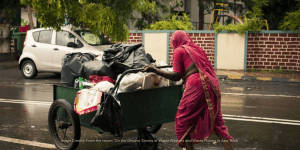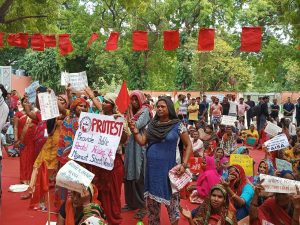Livelihoods Lost, Jahangirpuri’s Muslim Women Struggle With Economic & Emotional Precarity

On the morning of April 20, Raheema Begum* watched as her family’s only source of livelihood, a cold drink kiosk, was reduced to rubble during the anti-encroachment drive by the North Delhi Municipal Corporation in northwest Delhi’s Jahangirpuri area. As she consoled Sifan, her one-year-old baby, her sons, Raheem (16) and Asif (12), tried salvaging what they could of the wrecked kiosk – money, empty bottles, and unopened tetra packs.
As many as 50 shops, kiosks, and carts, mostly owned by Muslims, were demolished during the drive, claimed the residents of the area. The demolitions came four days after the area witnessed communal violence following a procession organised by the Vishwa Hindu Parishad, a right-wing Hindutva group, to mark Hanuman Jayanti. Miscreants were seen brandishing swords, sticks and guns. So far 25 people have been arrested by the Delhi police and five of them have been booked under the National Security Act, 1980 (NSA).

The anti-encroachment drive that followed the violence was a means to target small Muslim-run businesses and destroy their primary means of livelihood, residents alleged. No notice was given to those whose vends were demolished as mandated by the law. The demolition also damaged parts of homes where shops had been built into the compound.
Jahangirpuri was established around the mid-1970s as a resettlement colony for slum-dwellers. Its population is a mix of small entrepreneurs, labourers, scrap dealers and waste pickers. The colony has a high concentration of a Bengali-speaking population, both Muslims and Hindus, who had migrated from West Bengal, especially areas adjoining the Bangladesh border.
There is an air of uneasy calm in the colony now. The main road along the colony is heavily barricaded and gates to some of the lanes have been closed. There is visible deployment of police personnel and the Rapid Action Force (RAF) across a 2km-stretch of the main road.
While entire families have been hit by the demolition drive, it is women like Raheema who bear the brunt of its consequences. “The displacement significantly impacts women in caregiving roles; the burden of which is anyway high in poorer households, where the women have to take care of nutritional needs within limited budgets along with other responsibilities of care work,” said Ghazala Jamil, assistant professor at the Centre of Study of Law and Governance, Jawaharlal Nehru University.
Behanbox spoke to over a dozen women in the area and the stories that emerged showed that they were dealing with multiple problems and anxieties relating to loss of livelihood, police brutality, their children’s future and displacement. In instances where the men were injured or jailed, they were also left with the responsibility of sustaining their families while also handling carework.
BehanBox reached out to Delhi Police for comments. We will update the article when we get a response.
‘The tactic is familiar’
Local residents alleged that the incidents in Jahangirpuri followed the pattern of communal tensions in the Bharatiya Janata Party (BJP)-ruled Uttar Pradesh. “The bulldozer tactic is typical of the BJP-led government,” allegeds Sabeena* (24), a local resident. “Yogi [Adityanath, UP chief minister] does it in Uttar Pradesh and Amit Shah has replicated it in Delhi. It came days after the clashes. What else are we to believe except that this is a state-sponsored attack on the Muslims?

The Aam Aadmi Party-led Delhi government, especially chief minister Arvind Kejriwal, has been criticised for refusing to speak up in support of the area’s Muslims during the demolition drive. While stone-pelters who attacked the rally find mention in his tweet, there is no talk of the provocative slogans raised during the procession. Also AAP leader Atishi blamed the BJP for illegally sheltering “Bangladeshis and Rohingya Muslims” to “incite communal violence.”
The last time Delhi witnessed such large-scale violence along religious lines was in 2020 in the capital’s north-eastern localities. Mob-led violence had led to widespread destruction of life and property and most victims were Muslims. The violence came after provocative speeches by BJP leaders and MPs in the run-up to the Delhi assembly election. These set in motion an attack on those protesting against the Citizenship Amendment Act. The violence then spiralled and when the carnage ended, the death toll stood at 53, with over 200 injured.
Left with nothing
In the early hours of April 20, when she heard about the possibility of a demolition drive, Raheema went to clear out her kiosk, located close to her home. But she was not allowed by the police to take away even her merchandise and personal belongings, she said. “I was sent back twice by the police who maintained that the municipal corporation would only clear the waste lying around. I believed them because we had not been given any notice,” she said.
Later when she heard the sound of the bulldozers, she rushed out to find that the authorities had already destroyed half her kiosk. “I pleaded with them to stop but they did not pay heed,” she said.
“The kiosk and everything in it was worth at least Rs 3-4 lakh. I had bought the refrigerator on loan. It helped us earn Rs 400-500 a day, but now I will never be able to repay my loans,” she said. “It’s a struggle, really. It is difficult to even eat two square meals a day.”
Some of the wreckage lying in the debris could be sold as scrap, said Raheema. “I could have bought new clothes for my kids for Eid but the authorities would not let me take any of it,” she added.
The drive, she said, also ended up wrecking the cement steps to her house, and now with the main road barricaded and police restricting movement, it was becoming hard to step out of the house. “We have to jump from one terrace to another if we have to go out,” she said. The family now spends the day at Raheema’s mother’s house in a neighbouring bylane and returns home for the night.
Also demolished was a paan shop run by two brothers, Mukhtiar (28) and Akshar Ali (26), who have been arrested for the clashes. Moni* and Aspia*, their wives, said they have no means of livelihood or support.
‘Living in fear’
“This is a completely unconstitutional and unauthorised demolition drive, which is taking place in Jahangirpuri where violence took place recently. No notice was given to anyone and nobody was heard,” senior advocate Dushyant Dave had said in the Supreme Court as he moved an urgent plea on behalf of Jamiat Ulama-i-Hind, a social organisation, against the demolition. At 11 AM, the Supreme Court ordered “status quo” on the demolition but it took the authorities another hour-and-a-half to comply. They later cited the non-receipt of the official order as the reason for the delay.
A part of Sabeena’s house, which was being used to run a small convenience store along the main road, too was demolished. As she sat slumped against the broken wall in dismay, she said she had not been served any notice.
The presence of security personnel in the area remains heavy and this has sparked fears that there will be more government action, residents said. “The area that had been cordoned off remains largely inaccessible to the public. There is speculation that the authorities will continue the drive and raze our homes. Most of us are living with the constant fear of being rendered homeless at any moment now,” said Raheema.
Women pushback
Some of the women, however, did speak up in protest against the government’s actions.
“Did they think that we [women] would sit quietly when they take our husbands, our sons and our children?” said Nayyara**, 50. “We will fight back till our last breath because we are neither cowards nor wrong for fighting for our rights.”
Sabeena recalled the videographed act of women’s defiance that also went viral over social media. “After the men from our community were arrested, we went to the police station. There we saw a mob of 300 Bajrang Dal members who started shouting ‘Jai Shri Ram’. We were scared because there were only 10 of us. Our legs were trembling with fear but we decided to fight back. We started shouting ‘Allahu Akbar’,” she said.
As Right wing orgns start chanting “Jai Shri Ram” and “go back to Pakistan” slogans Muslim women shout “Allah hu Akbar” outside Jahangirpuri Police Station. Situation tensed. pic.twitter.com/LiWrRK6OOm
— Nikita Jain (@nikita_jain15) April 17, 2022
“We are Muslims and we bow only in front of Allah. We will fight back for our rights,” said Sabeena*, as her family members sitting around her nodded in approval.
Back to the wall
“In cases of both communal violence and demolitions, communities are displaced. While the former forces people to migrate primarily due to hostility, the latter is a direct result of actions of the state agencies,” said JNU scholar Jamil.
In instances of communal violence, Muslim women end up bearing the added responsibility of keeping the men from their community safe from state excesses, she pointed out. “Muslim men have long been a target of state violence and arguably, are even more vulnerable than Muslim women, in this regard. There have been reports about the sexual nature of the torture techniques used against Muslim men,” she said.
Before daybreak, in the early hours of April 17, Delhi Police arrested the Ali brothers and their brother-in-law, a minor, on the charge of being involved in the communal clashes. “About 15 of them (the police) barged into their home and arrested them. Even before the police brought them out of the building, they had been beaten black and blue,” said their sister Manu, 35.
When Manu and her sisters-in-law, Aspia and Moni, tried to intervene, the police beat them too, they alleged. “They beat us like dogs and flung us into the lanes when we tried to stop them. I hurt my head and got a black eye as well. But they did not stop,” said Manu pointing to injury marks under her right eye. “They did not even spare Akshar’s 6 year-old son. He was pushed by the police and hurt his lip.”
Sabeena said she tried to intervene and demand answers. “They started abusing us and passing derogatory remarks,” said Sabeena. When she requested the police to help drop the injured women to the nearest hospital, the police refused. “They said they ‘did not care whether the women lived or died’,” she said.
Entire families now stare at an uncertain future. “They took our men, demolished our shop, and restricted our movement. For how long will we survive like this?” asked Manu.
‘We fear for our children’s future’
What happened in Jahangirpuri fits a new pattern of communal violence stirred up in the wake of religious processions, noted a report in The Wire, pointing to similar incidents in Gujarat and Madhya Pradesh. Armed groups of pass through Muslim neighborhoods shouting inflammatory anti-Muslim slogans which often result in a communal skirmish or a riot, the report said, and eventually, prohibitory orders have to be imposed followed by a series of arrests.
In the aftermath of communal violence at Jahangirpuri, UP CM Adityanath issued a new set of directives banning religious processions unless they were held with requisite government permissions.
Jahangirpuri’s residents pointed out that this is the first time the area has seen communal violence on this scale. “We have never witnessed anything like this in all these years,” said Minara** (30). “But ever since the BJP came to power, Muslims have been treated like second-class citizens. Muslim lives have no value and we are discriminated against socially and economically.”
Rukhsana**, a mother of two, sells biryani to earn a living, and though her business has not been hit by the violence she said being a Muslim now “feels like a sin” and she fears for her children. “I have been to many places and have never been made to feel conscious about my religion. However, under the BJP, it has become clear that our religious identity will lead to our oppression,” she said. “We are poor people. My children are not educated enough to get a job. What if they come for our business or our homes tomorrow? Where will I go?”
Like several others, she said she is frightened by the heavy presence of security forces in the area. “Each time I see them, I feel like something is about to go wrong,” she said.
*Most women we interviewed in Jahangirpuri chose to only use their first name.
** Name changed to protect the speaker’s identity.
We believe everyone deserves equal access to accurate news. Support from our readers enables us to keep our journalism open and free for everyone, all over the world.




